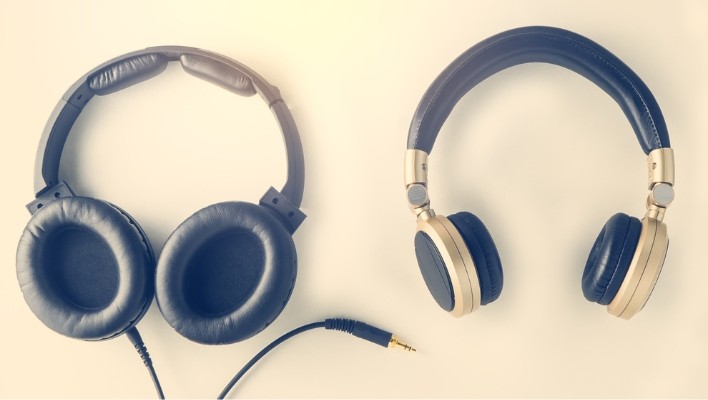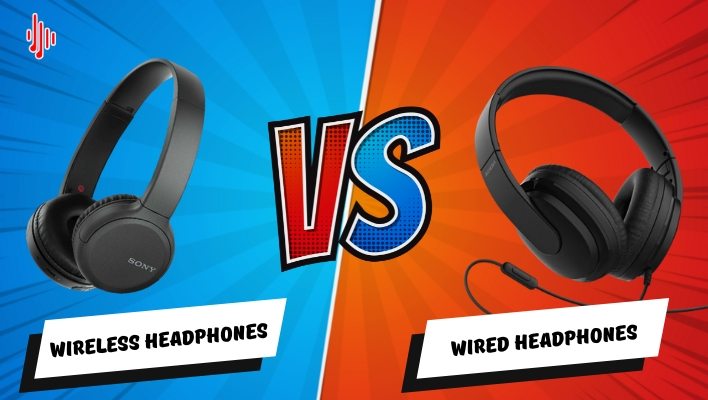Headphones have become an integral part of the modern-day lifestyle, allowing users to listen to their favorite music, podcasts, and audiobooks without disturbing others. However, headphones have a wide range of features and technologies that can make choosing the right pair tricky. In particular, users must decide between wired and wireless headphones, and understanding the differences is essential in making the best choice for their needs. In this article, we will examine the advantages and disadvantages of wired and wireless headphones, helping to make the decision-making process easier.
Differences Between Wired and Wireless Headphones
There are several differences between wired and wireless headphones, including the following.

Sound quality
In general, it is commonly believed that wired headphones offer better sound quality than wireless headphones. This is because a wired connection can transmit data more quickly and accurately than a wireless signal, resulting in more precise and detailed sound. However, it is important to note that the actual sound quality of a pair of headphones can vary depending on the specific model and its features. Additionally, technological advances have led to the development of high-quality wireless headphones that can offer sound quality comparable to wired headphones. Ultimately, the decision between wired and wireless headphones should be based on personal preferences and individual listening habits.
Battery life
Because wired headphones do not require battery power, they do not have any limitations in terms of battery life. This means they can be used for as long as they are connected to a power source, such as a phone or a computer. On the other hand, wireless headphones rely on battery power to operate, which means they are subject to battery life limitations. The exact battery life of a pair of wireless headphones can vary depending on the specific model and its features, such as Bluetooth technology and active noise cancellation. Some wireless headphones may have longer battery life than others, but all require regular charging to continue functioning.
Portability
Wireless headphones are more portable than wired headphones because they do not have a wire that needs to be connected to a device. This means they can be easily taken on the go and used for activities such as exercising or traveling. Additionally, the lack of a wire can make wireless headphones more comfortable, as there is no wire to get in the way or weigh the headphones down. On the other hand, wired headphones may be more suitable for use in a stationary setting, such as at a desk or studio.
Compatibility
While wired headphones can be easily used with any device with a standard headphone jack, such as a phone or a computer, many modern devices do not have a headphone jack. This means that wired headphones may not be compatible with these devices and may require an adapter to connect. On the other hand, wireless headphones require a device compatible with their wireless technology, such as Bluetooth. This means you can use them with a wider range of devices, including those without a headphone jack.
Price
In general, wired headphones tend to be less expensive than their wireless counterparts. This is because the technology used in wired headphones is simpler and more straightforward, which allows manufacturers to produce them at a lower cost. On the other hand, wireless headphones require more advanced technology, such as Bluetooth connectivity, which can increase their price. Additionally, the batteries and other components used in wireless headphones can also add to their cost. Overall, a wired option is likely your best bet if you’re looking to save money on headphones.

Choosing the Right Type of Headphones
Choosing the right type of headphones depends on individual needs and preferences. There is no “one-size-fits-all” solution, and what works for one person may not be the best option for another. To make the right choice, it is important to consider several factors, such as the intended use, the listening environment, and the budget.
Here are some tips for choosing the right type of headphones:
Consider the intended use
If you plan to use the headphones for activities that require a lot of movement, such as exercising or traveling, wireless headphones may be a better option. They allow you to move around freely without being tethered by a cable, and they are less prone to tangling. On the other hand, if you plan to use the headphones for long listening sessions or in environments where wireless signals may be unreliable, wired headphones may be a better option. They provide a more direct and stable connection and don’t require regular charging.
Consider the listening environment
If you plan to use the headphones in a quiet environment, such as at home or in the office, wired headphones may be a better option. They can provide better sound quality and more detail, thanks to the direct physical connection to the audio source. On the other hand, wireless headphones may be a better option if you plan to use headphones in a noisy environment, such as on a plane or in a crowded public place. They allow you to listen to your audio without being tethered to the audio source, and they can be used with noise-canceling technology to reduce background noise.

Consider the budget
If you are on a tight budget, wired headphones may be a more affordable option. Wireless headphones are generally cheaper than their wireless counterparts, especially regarding high-quality models. However, if you are willing to spend more, wireless headphones can offer a more convenient and flexible listening experience. Remember that the price of headphones can vary widely, depending on the brand, features, and other factors, so it is important to shop around and compare different options before making a decision.
Conclusion
In conclusion, both wired and wireless headphones have their advantages and disadvantages. Wired headphones are more reliable and are often cheaper than wireless headphones. They also provide better sound quality and are always ready to use. On the other hand, wireless headphones offer more freedom of movement and portability. They also provide convenience and are often more comfortable to wear. Ultimately, it comes down to personal preference and which features are most important to you when selecting headphones.
